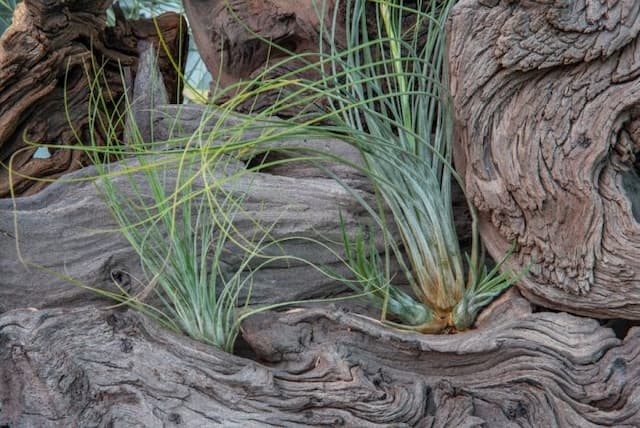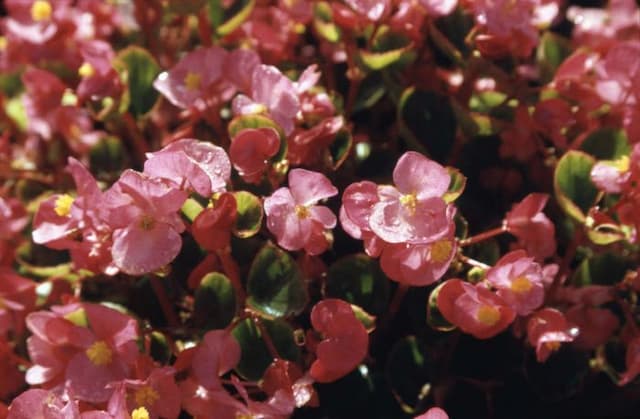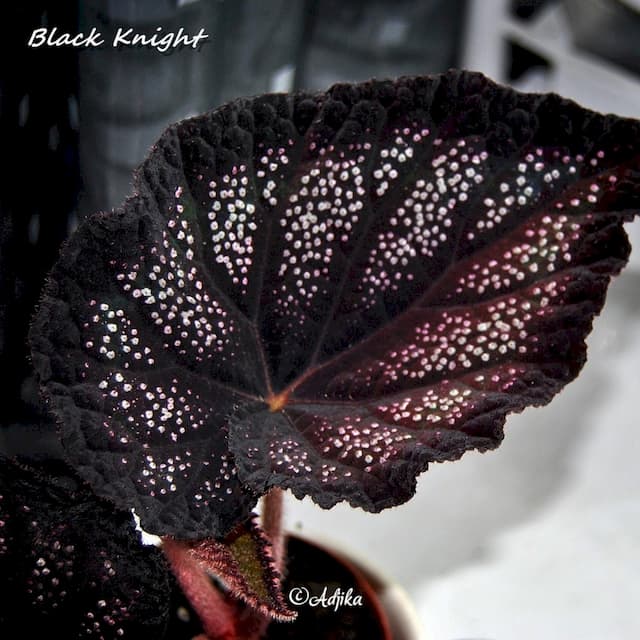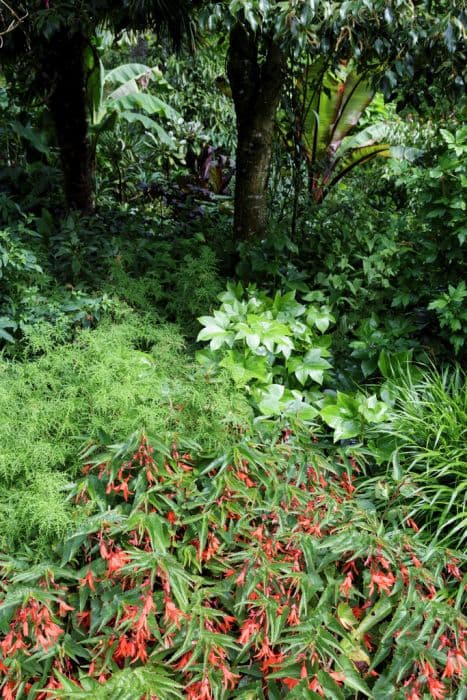Begonia Begonia Allure (Million Kisses Series)
![begonia [Allure]](/_next/image?url=https%3A%2F%2Fplants-admin.emdemapps.com%2Fimages%2Fplants%2F%2Fimages%2F604b5b9006ab9.png&w=3840&q=75)
ABOUT
Begonia Allure, from the Million Kisses Series, is a striking plant known for its showy and abundant blooms. The plant features clusters of delicate, heart-shaped flowers that come in a vibrant range of pinks, reds, and oranges, which dangle gracefully from arching stems. The petals possess a soft, satiny texture and radiate with a luminous quality that seems to catch and reflect light. The foliage of Begonia Allure is equally attractive. The leaves are glossy and exhibit a rich green color, with some variants showing off hints of red or bronze, particularly along the edges and veins. The shape of the leaves varies from broadly ovate to slightly elongated, with a pointed tip and edges that are either smooth or gently toothed. Begonia Allure is a vigorous grower and tends to have a trailing or cascading habit, making it an ideal candidate for hanging baskets or as a spiller plant in mixed containers where it can elegantly spill over the edges. Its lush leaves and plentiful flowers create an enchanting and full-bodied display that continues throughout its growing season, offering a visually pleasing spectacle. Adding to its allure, this begonia has a long blooming period, enticing gardeners with its persistent and stunning presentation of color. The overall impression of Begonia Allure is one of romance and abundance, with the juxtaposition of its flowery cascades against the vibrant greenery making it a beloved addition to any plant lover's collection.
About this plant
 Names
NamesFamily
Begoniaceae
Synonyms
Begonia Allure, Million Kisses
Common names
Begonia 'Allure'.
 Toxicity
ToxicityTo humans
Begonia Allure, commonly known as Begonia, is not considered to be highly toxic to humans. However, ingesting parts of the plant can lead to potential health issues, as all parts of begonias contain soluble calcium oxalates. If ingested, these compounds can cause irritation of the mouth, throat, and gastrointestinal tract. Symptoms may include a burning sensation in the mouth, difficulty swallowing, nausea, vomiting, and diarrhea. In most cases, symptoms are mild and self-limiting. Consuming large quantities, though rare, could lead to more serious effects and would require medical attention.
To pets
Begonia Allure, commonly known as Begonia, is considered toxic to pets, especially cats and dogs. All parts of the plant contain soluble calcium oxalates, which can be poisonous when ingested. Symptoms of poisoning in pets can include oral irritation, drooling, vomiting, and difficulty swallowing. In severe cases, ingestion can lead to kidney failure or other serious complications. If you suspect your pet has ingested begonia, consult your veterinarian immediately for proper treatment.
 Characteristics
CharacteristicsLife cycle
Perennials
Foliage type
Deciduous
Color of leaves
Green
Flower color
Pink
Height
1 foot (30 cm)
Spread
1 foot (30 cm)
Plant type
Herb
Hardiness zones
9
Native area
South America
Benefits
 General Benefits
General Benefits- Easy Maintenance: The Begonia Allure is known for being low maintenance, making it suitable for gardeners of all experience levels.
- Vibrant Blooms: It features abundant and colorful flowers that can brighten up any space.
- Long Flowering Season: This plant has a long blooming period, offering continuous color from spring to fall.
- Drought Tolerant: Once established, it can tolerate periods of dryness, reducing the need for frequent watering.
- Attracts Pollinators: Begonia Allure can attract beneficial insects like butterflies and bees to your garden.
- Versatile Usage: It can be used in hanging baskets, containers, and as a ground cover, providing flexibility in landscaping and garden design.
- Resistant to Pests: This cultivar is generally resistant to common garden pests, reducing the need for chemical treatments.
- Non-Invasive: The plant is not known to be invasive, making it a responsible choice for gardeners concerned about the local ecosystem.
 Medical Properties
Medical PropertiesThis plant is not used for medical purposes.
 Air-purifying Qualities
Air-purifying QualitiesThis plant is not specifically known for air purifying qualities.
 Other Uses
Other Uses- Begonias like the Million Kisses Series can be used in edible flower arrangements or as garnishes, due to their vibrant colors and unique shapes, but always ensure that they haven't been treated with pesticides and are safe to eat.
- These plants can serve as natural indicators for humidity levels, as Begonias often require a well-balanced moisture environment; when they thrive, it suggests good indoor humidity.
- Crushed Begonia leaves can be rubbed onto skin to relieve pain from minor burns or scrapes, though it's not a substitute for professional medical treatment and one must make sure they're not allergic.
- Begonia petals can be used in crafts or art projects, such as making bookmarks or pressed flower arrangements, due to their interesting shapes and colors.
- The waxy leaves of the Begonia Million Kisses Series can be used for leaf casting to create decorative items like stepping stones or birdbaths for gardens.
- These Begonias can be subjects for photography enthusiasts, offering vibrant live subjects for macro photography and natural light composition studies.
- Classes on plant care and propagation can use the Begonia Million Kisses Series as ideal examples due to their ease of propagation through cutting.
- They can inspire designs and patterns in fashion and textiles, with their unique foliage patterns and colors often serving as a muse for artists and designers.
- As part of a sensory garden, Begonias add not just visual appeal but also a variety of textures for tactile exploration, beneficial for both children and adults with sensory processing needs.
- Employed in color therapy or chromotherapy, the bright and varied shades of Begonias can be used to positively influence emotions and mental states.
Interesting Facts
 Feng Shui
Feng ShuiThe Begonia is not used in Feng Shui practice.
 Zodiac Sign Compitability
Zodiac Sign CompitabilityThe Begonia is not used in astrology practice.
 Plant Symbolism
Plant Symbolism- Beware: In the language of flowers, begonias can symbolically carry a warning or cautionary message, suggesting to the recipient to remain vigilant or cautious.
- Harmony: The balanced growth and lush appearance of begonias represent harmony and can be a symbol for a balanced and peaceful existence.
- Gratitude: Gifting begonias can be an expression of appreciation, symbolizing gratitude for someone's kindness or friendship.
- Individuality: Due to the wide variety and uniqueness of begonias, they can symbolize individuality and the celebration of one's unique qualities.
- Unconventional Beauty: Begonias aren't traditionally seen as the most classic or conventional flowers, symbolizing the idea that beauty comes in many forms.
 Water
WaterThe Begonia 'Allure' prefers to be watered when the top inch of soil feels dry to the touch. It's best to water this plant thoroughly, allowing the excess water to drain out of the pot, which means you might water it with approximately 16 to 24 ounces every 7 to 10 days, depending on the environmental conditions. Avoid letting the plant sit in water as this can lead to root rot. During the growing season in spring and summer, the 'Million Kisses' Begonia may require more frequent watering due to increased growth and higher temperatures. Make sure to reduce watering in the cooler, dormant periods like fall and winter.
 Light
LightThe Begonia 'Million Kisses' thrives in bright, indirect sunlight. It's best placed in a location where it can receive plenty of light without being exposed to the harsh midday sun, like an east or west-facing windowsill. Direct sunlight can scorch the leaves, while too little light can cause weak growth and fewer flowers.
 Temperature
TemperatureBegonia 'Allure' prefers temperatures between 60 to 75 degrees Fahrenheit for optimal growth. It can tolerate a minimum temperature of 50 degrees Fahrenheit but should not be exposed to temperatures below this as it can damage the plant. Avoid placing your 'Million Kisses' Begonia in areas with drafts or sudden temperature changes which can stress the plant.
 Pruning
PruningPruning the Begonia 'Million Kisses' is important to maintain its shape and encourage bushier growth. Pinch or cut back the long stems during the growing season, preferably in the spring. Deadhead spent flowers to promote continuous blooming and remove any yellow or dead leaves to keep the plant looking tidy. Pruning can be done every few weeks or as necessary to keep the plant in shape.
 Cleaning
CleaningAs needed
 Soil
SoilBegonias prefer a well-draining soil mix with a slightly acidic to neutral pH of 5.5 to 6.5. A good recipe for Million Kisses Begonia would be a mix of peat moss, perlite, and vermiculite in equal parts to ensure proper drainage and aeration.
 Repotting
RepottingMillion Kisses Begonia typically needs to be repotted every 2-3 years. It's best to repot in spring before the new growing season begins, using a slightly larger pot each time to accommodate root growth.
 Humidity & Misting
Humidity & MistingMillion Kisses Begonia thrives in moderate to high humidity levels, ideally around 50-70%. If the air is too dry, the leaves may become crispy, so maintaining adequate humidity is crucial for this plant's health.
 Suitable locations
Suitable locationsIndoor
Place in bright, indirect light with high humidity.
Outdoor
Keep in partial shade, sheltered from strong winds.
Hardiness zone
10-11 USDA
 Life cycle
Life cycle_begonia Allure, part of the Million Kisses series, begins its life as a small seed, which when sown in fertile, well-draining soil and given appropriate warmth and moisture, will germinate. After germination, the seedling emerges with its initial set of leaves, and as it grows, it develops a strong stem and more complex leaf structures typical of begonias. The vegetative stage follows, during which the plant matures and produces its lush, foliage and begins to form flower buds. Entering the blooming stage, Begonia Allure showcases numerous vibrant, cascading flowers that attract pollinators and can last through the season until unfavorable weather arrives. As temperatures drop, or in drought conditions, the plant enters dormancy or dies back, storing energy in its tuberous roots if the species is perennial. In spring, if perennial, the plant will re-emerge from its tuberous roots or will require replanting if treated as an annual, continuing its cycle anew.
 Propogation
PropogationPropogation time
Spring-Summer
Propogation: The most popular method of propagating Begonia 'Allure' from the Million Kisses Series is through cutting. Typically, the best time for propagation is during the spring or early summer when the plant is actively growing. To propagate by cutting, a healthy stem is chosen, and a sharp, clean pair of scissors or a knife is used to cut a piece that includes at least one node, usually about 4 to 6 inches (10 to 15 cm) in length. The bottom leaves are removed and the cut end is dipped in rooting hormone to encourage root growth. The cutting is then placed in either a moist potting mix, vermiculite, or water until roots have developed, after which it can be transplanted into a pot with fresh soil to continue growing. This method is preferred as it maintains the desirable traits of the parent plant and usually results in a successful rooting.









